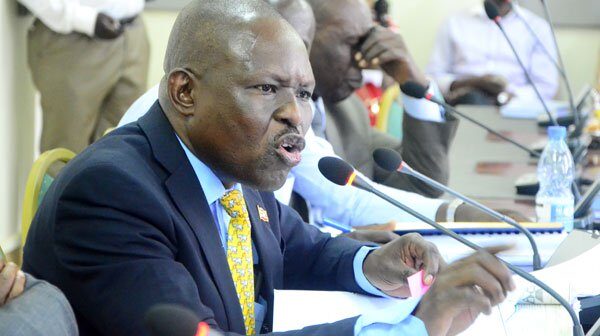Parliament’s committee on Sub-Committee on Commissions, Statutory Authorities and State Enterprises (COSASE) have been dealt a blow after court ruled that its subcommittee did its work illegally as it tried to act as court in investigating properties under the Departed Asians Property Custodian Board (DAPCB).
Mohamed Allibhai, the applicant had dragged the Attorney General to court seeking court to review the acts of the COSASE subcommittee in investigating properties already handled by court and other processes, confirming rightful ownership.
Remember the Attorney General Kiryowa Kiwanuka had already distanced himself from the committee’s report recommending the cancellation of repossession certificates held by owners of the properties, stating that it could result in law suits.
In a ruling by Justice Boniface Wamala dated June 4, 2022, Court agreed with Allibhai that COSASE’ work was illegal, and awarded him costs of the application against the Attorney General (government).That means COSASE has cost taxpayers money due to recklessness.
The judge stated that COSASE Sub-Committee acted ultra vires, and thus illegally, when it investigated properties that were subject of concluded court decisions or on-going court processes.
The judge agreed that COSASE Sub-Committee acted ultra vires, and thus illegally, when it made recommendations that purport to overturn court decisions.
“The COSASE Sub-Committee exceeded its mandate and acted without jurisdiction, and thus illegally, when it purported to investigate properties already dealt with under the Expropriated Properties Act and in respect of which certificates of repossession had long been issued.”
Adding that: “The COSASE Sub-Committee acted ultra vires and without jurisdiction, thus illegally, when it made recommendations for cancellation of repossession certificates in respect of properties that had already been dealt with in accordance with the Expropriated Properties Act.”
He also agreed that COSASE Sub-Committee acted with bias and in abuse of the principles of natural justice, thus with procedural impropriety and unfairness, when it issued a warrant of arrest against the Applicant.
He also ruled an order quashing and expunging from the Hansards of Parliament those parts of the COSASE Sub-Committee report that relate to the Applicant and are affected by the illegalities, procedural impropriety and unfairness contained in the declarations.
Additionally, he quashed and expunged from all official records the warrant of arrest issued against the Applicant.
Justice Wamala also has ordered the prohibition and barred the Respondent [Attorney General COSASE], their servants, agents or any other body or persons from enforcing the recommendations of the COSASE Sub-Committee in as far as they relate to the Applicant or the affected properties.
The application was brought by Notice of Motion under Articles 28, 42, 44 (c) and 50 of the Constitution; Sections 36 and 38 of the Judicature Act Cap 13; and Rules 3, 6, 7 and 8 of the Judicature (Judicial Reviews) Rules, S.I. No. 11 of 2009 as amended.
Background
COSASE sub-committee about a year tabled a report to parliament with recommendations over the repossessed departed Asians’ properties. However their implantation was immediately rejected by the Attorney General and now court has followed the same, raising questions about the credibility of COSASE’s work.
Chaired by the then Makindye East MP Ibrahim Kasozi, the COSASE sub-committee investigated the alleged in DAPCB for over a year in the wake of the findings of the Auditor General’s report of 2016, had recommended the cancellation of the repossession of properties whose original proprietors did not return to the country physically.
During the probe, the sub-committee had observed that most of the expropriated properties were being managed by agents most of them now real estate moguls in Uganda, on behalf of the Asians who never returned by 1993, about two decades after their 1972 expulsion by former president, Iddi Amin.
“All repossessions whose former owners didn’t return physically to manage the properties as required by law should be cancelled or revoked for being null and void. The minister should invoke his/her powers under section 9(1) of the Expropriated Properties Act (EPA) to make an order to either retain such properties as government or the same be disposed of in a manner prescribed by regulation 11 of the Expropriated Properties (Repossession and Disposal) Regulations,” reads part of the recommendations in the COSASE report.
Parliament further adopted the recommendations that called for revocation of transfers of ownership of properties that had been done on basis of letters of repossession and called for prosecution of individuals who perpetrated the repossessions because it was fraudulent. Such properties it was recommended would revert to the government of Uganda.
But the AG advised the finance minister Matia Kasaija who is the supervisor of DAPCB that in response to recent debates with in the government any action on some of the recommendations of the COSASE sub-committee will increase lawsuits. Allibhai could take advantage of the Attorney General’s advice about the lawsuits to come and indeed he has won.
“Although the COSASE sub-committee investigations elicited findings similar to those of the Auditor General’s report, the recommendations of the COSASE sub-committee that the departed Asians board initiates the process of cancellation of certain repossession certificates and any substitute title is legally untenable,” Kiryowa stated.
He based his opinion on the provisions of section 9(1)(d) of the Expropriated Properties Act Capt 87 and case law, saying if the government loses such cases that may arise from actions that are legally untenable, there could be huge financial losses in costs awarded by courts of law.
Kiryowa opined that once the certificate of repossession have been issued in respect of expropriates properties, then the DAPCB has no mandate whatsoever to deal with such property because its divestiture committee does not have powers to repossess, manage or allocate any property that has been dealt with by the Minister of Finance.
“Once the minister of finance has dealt with an expropriated property by issuing a repossession certificate, a certificate of purchase or certificate of receipt, he or she has no powers under the act to cancel the certificate issued even if there was an error on the part of the government,” he guided.
The COSASE sub-committee caused tremor over the ownership or management of several properties in Kampala and countrywide as it looked to open wounds of past fights over expropriated properties.
However, Kampala tycoon Sudhir Ruparelia successfully argued before the sub-committee regarding the ownership of plot 24, Kampala road after DAPCB had testified that the prime property was never repossessed and ought to be in hands of the government.
In its report, the COSASE sub-committee listed Sudhir as the rightful owner of the property having floored DAPCB in court in 2012.
Sudhir’s case is one of the 13 cases that DAPCB had lost by the time of the probe. The DAPCB had so far won 10 cases, whereas 99 cases remained unconcluded.



